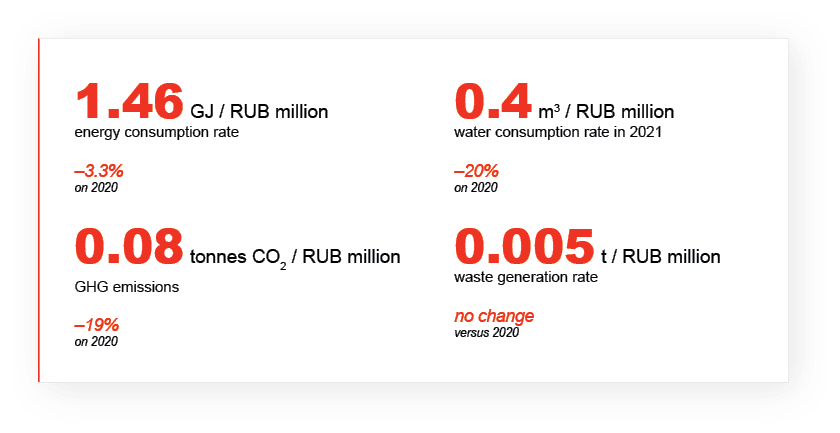RESOURCE EFFICIENCY AND ENVIRONMENTAL IMPACT

In its operations, Moscow Exchange Group adheres closely to the ESG principles, including when it comes to environmental responsibility. It commits to responsible investment principles by encouraging listed companies and traders to abide by ESG principles as well. The Group shares the environmental concerns of its stakeholders, and it strives to make a difference by minimizing any negative impact on the environment.
The primary environmental impact of the Group’s companies stems from electricity consumption associated with the operation of server and computer equipment processing a significant amount of data (the data centers account for about 36% of Moscow Exchange’s total electricity consumption). Generation of the electricity consumed by the Group’s companies generates GHG emissions that can affect the climate. Therefore, the management of Moscow Exchange Group incorporates climate risks into its risk management system and keeps track of GHG emissions. See the subsection “Climate agenda” for details.
Other environmental impacts, including water consumption and waste generation, are mainly associated with the operation of Moscow Exchange’s offices. This subsection presents measures taken to ensure sustainable water use and waste management; metrics and their values are provided in the subsection “Resource efficiency and environmental impact” of the section “Sustainability Data”. Methods for managing environmental issues are described in the section “Sustainability Approaches and Procedures”.
- UN Sustainable Development Goals
- SDG 12.2, 12.4, 12.5, 12.6, 12.8 Responsible consumption and production
- SDG 13.1, 13.3 Climate action
2021 highlights
The Group aims to improve the efficiency of its energy and water consumption, reduce waste generation, and increase the amount of waste recycled. To achieve its objectives, the Group sets an annual goal of adhering to a zero increase in the rates of energy use, GHG emissions, water consumption, and waste generation.
302-3 305-4
2021 performance highlights Targets for 2021 are based on 2019 performance, as 2020 performance is not comparable due to changes in operations on account of the COVID-19 pandemic. :
- energy intensity per revenue decreased by 3.3% compared to 2020; data center energy consumption per revenue decreased by 7.3%;
- GHG emission intensity per revenue dropped by 19% compared to 2020;
- water consumption intensity per revenue dropped by 20% compared to 2020;
- waste generation intensity per revenue remained at the same level as 2020.
Energy consumption
The Group has continual measures in place to optimize electricity and heat consumption, including the following:
- switching server processors to energy-saving mode when not under load;
- turning off office lighting and climate control equipment outside office hours;
- replacing light fixtures with energy-saving LED lamps when building or renovating premises.
In 2021, Moscow Exchange Group transferred all its office buildings on Bolshoy Kislovsky Lane and Spartakovskaya Street in Moscow to green electricity produced at Ulyanovsk Wind
302-1
In early 2022, the Group signed another commission contract for the supply of green energy to the DataSpace data processing center, where Moscow Exchange’s hardware and software systems are located. In 2022, the planned supply will exceed 15.8 million kWh, or more than 90% of Moscow Exchange’s electricity consumption. The use of clean and renewable energy will allow Moscow Exchange to minimize its carbon footprint in line with best practices in sustainability.
In the near future, Moscow Exchange plans to reduce its overall electricity consumption by switching to more energy-efficient network equipment.
Use of green energy will help prevent GHG emissions and reduce Scope 2 indicators.
Water consumption
Water consumption in 2021 was affected by the global pandemic and the ensuing waves of COVID-19. Due to periodic deterioration of the epidemiological situation, most employees worked remotely, which affected the levels of energy and water consumption at our office and other premises (such as the fitness club). Compared to 2020, total water consumption increased slightly, while the specific water consumption per employee in
Waste management
306-1 306-2
Waste generated by the Group’s companies mainly consists of solid non-industrial waste and e-waste (see the section “Sustainability Approaches and Procedures” for more information).
In 2021, the amount of waste generated increased by 22.1%, mainly due to an increase in low-hazard waste (Hazard Class IV). In accordance with the law and the Waste Generation Standards and Waste Disposal Limits, all generated waste is transferred to specialized contractors (including 95% of waste for disposal).
The Group’s companies have organized separate collection of non-industrial waste and waste paper for recycling.
Plans for 2022
According to the Sustainability Roadmap, the Group’s plans include the following:
- develop the climate risk management system of the Group and improve communication with financial market participants regarding the climate agenda;
- implement annual energy efficiency measures;
- implement annual measures for waste management and sustainable water use;
- hold environmental campaigns about collecting certain types of waste.
